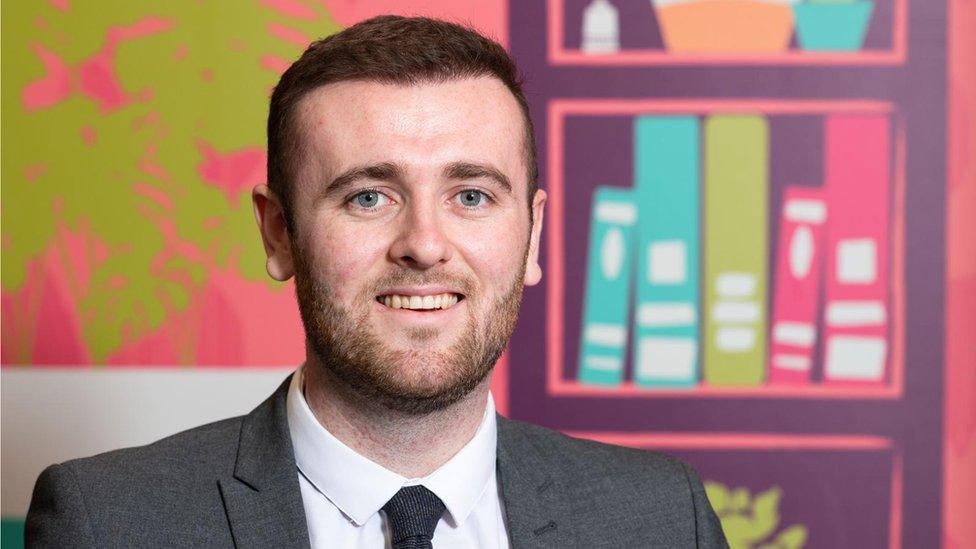Covid: Asylum seeker camp conditions prompt inspection calls
- Published
Residents of an asylum seeker camp in Pembrokeshire says life is 'very bad'
Asylum seekers housed in a military training camp have claimed the "very bad" conditions are making them feel increasingly desperate.
The Home Office decided to house up to 250 asylum seekers at the site in Penally, Pembrokeshire, from September.
But some housed at the camp claim the conditions are unsafe and putting them at risk of coronavirus.
Plaid Cymru has called for an urgent inspection, but the Home Office said it was safe and "Covid-compliant".
On Thursday afternoon, the independent chief inspector for borders and immigration David Bolt said he hoped an inspection can begin "within a few weeks" and was awaiting further details he requested from the Home Office.
Protests and counter-protests have taken place at the camp, with concerns conditions breach human rights.
First Minister Mark Drakeford has said the facility was "unsuitable" for vulnerable people who have "fled terror and suffering".
Now, asylum seekers have spoken to the BBC about their experiences of living in the camp during the pandemic, with some claiming the site does not abide by Covid-19 rules.
'Overflowing toilets'
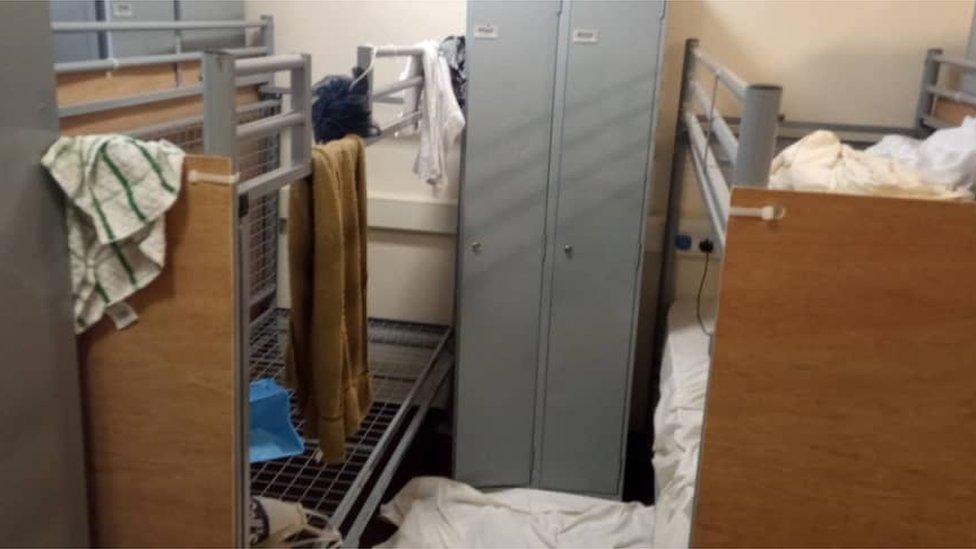
Photos taken inside the camp show the living conditions in one of the rooms
One man, who wishes to remain anonymous, arrived at the camp on 1 October.
He said he had pain from "old injuries" obtained in Syria, but had to wait "four days" to see a doctor. He also has concerns about hygiene facilities at the camp.
"There is no observance of the Covid safety laws," he said, claiming "six men" share a small bedroom, dozens eat in the same room, and some staff preparing food do not wear face masks.
Video footage and photographs of the camp, seen by BBC Wales, show bathroom floors covered with water, every toilet in one bathroom blocked, beds in communal rooms less than 2m (6ft) apart and a bathroom where all the soap dispensers are empty.
The Home Office said medical need determined GP appointments, social distancing was required, and soap was replenished at the site.
The man said the camp's conditions had left him in a "bad psychological state" and others had attempted self-harm: "Should I try to hurt myself to get out of here?"
He said he and other residents were able to leave the camp as long as they are back by 22:00 GMT, but said he was reluctant to go out due to the "humiliation, abuse and racism" he has experienced.
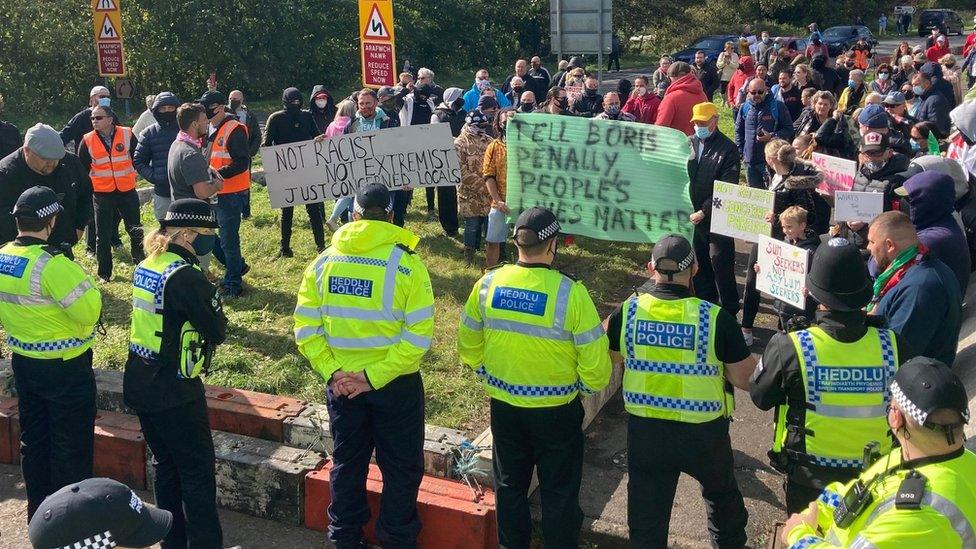
The site has attracted protests in recent months
While some have welcomed the refugees, posting welcome notes outside the gates, the camp has been described as a target for "hard-right extremist" protesters.
The Home Office said that, where someone claims their mental health is suffering, it would consider if their needs can be met at the site.
Another resident, from Eritrea, north-east Africa, said life in the camp was stressful, and people were being "treated like prisoners".
"For the Eritrean community in this camp, the most difficult thing is we escaped from our country from indefinite military service and illegal imprisonment," he said.
"So we feel like we are imprisoned in a military camp. It is all coming back to us."
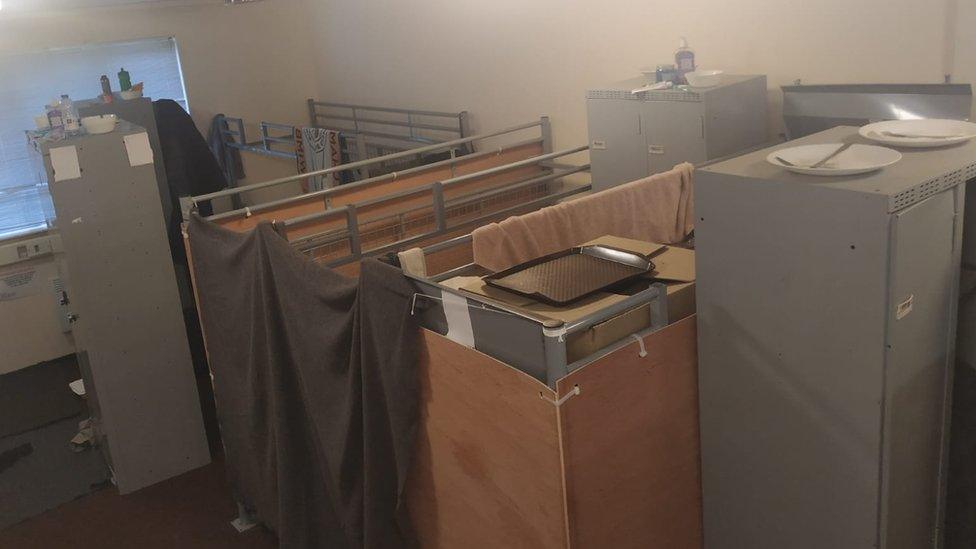
One resident said it was impossible to maintain social distancing in a room with six people
The man said he had been told to be careful and to abide to Covid rules, but there was "no protection" as he was sleeping in a room with five others.
"Most of the bathrooms - they are broken," he said.
"They are filled with tissues, masks, everything you can find, they are blocked, they don't work."
He said he had not been offered a coronavirus test since arriving about three months ago.
The Home Office said residents had often entered the UK some time ago, and had been mainly placed in the camp after being in the south-east of England and around London.
It added that coronavirus tests were only necessary in line with Welsh Government guidance.
It added that Clearsprings Ready Homes, which manage the camp, took immediate steps to repair damage.
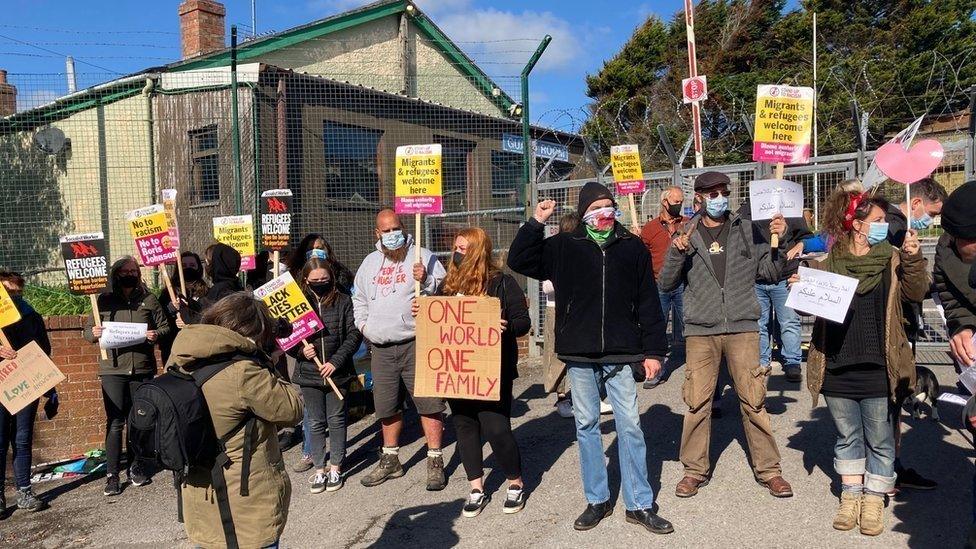
Some have welcomed the asylum seekers in the community
But Plaid Cymru's leader in Westminster, Liz Saville Roberts, has called for an "urgent" and "transparent" inspection of the site.
In a letter to the UK's Independent chief inspector of borders and immigration, David Bolt, the MP said: "We are now not only in the middle of winter, but cases of Covid-19 in Wales are rising at an alarming rate.
"I am extremely worried that the conditions at the old military barracks are wholly unsuitable to deal with the cold weather and to facilitate effective social distancing.
"This shows a clear disregard for the health and wellbeing of those being kept in the camp."
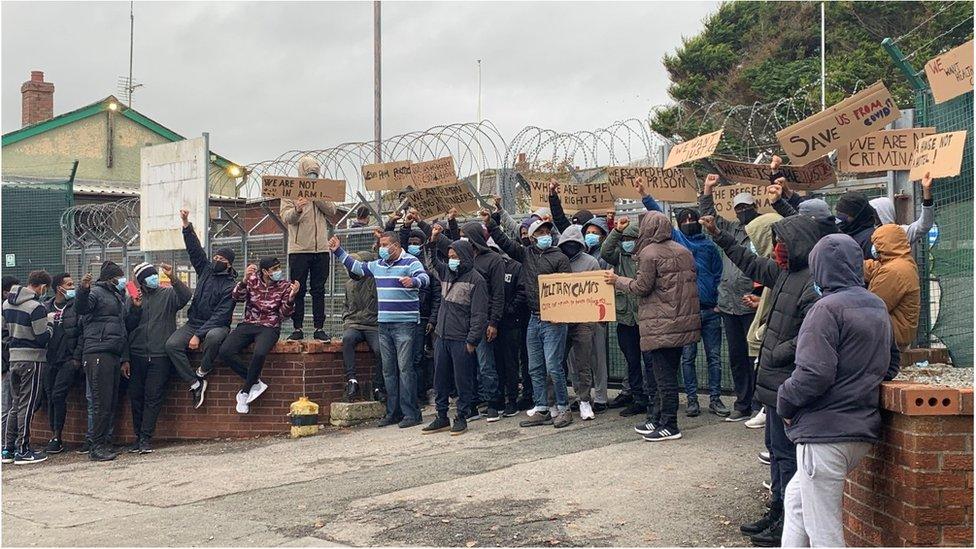
About 40 men took part in the protest outside the camp in November over claims their human rights were being breached
She told BBC Radio Wales: "If we aspire to be a nation of sanctuary, surely we should be looking at how people, while they are with us, are integrated into our communities and given all the services that they need, rather than putting them in a convenient enclosed space in a tiny community which is ill equipped itself to deal with this... Let alone far right protests outside and all the pressure that's put on the local population.
"We need to make sure that this doesn't set a precedent into the future."
Mr Bolt told Ms Saville Roberts he had "received assurances" from the Home Office that the Penally camp had an independent Covid-19 audit on 4 November.
In a letter, he said he hoped an inspection could be held "within a few weeks".
He said he was keen to understand how the Home Office "was assuring itself" individuals who were particularly vulnerable, including torture victims, potential victims of modern slavery, and those with complex health and other needs, were being identified and action taken to safeguard them.
He said: "While on site I would expect the only restrictions to be those relating to Covid-19 and that inspectors would be free to examine the premises and facilities, observe daily life and interview staff and service users, and I would look to the Home Office to ensure that whoever is responsible for managing the site understands that they must cooperate with the inspection team."
In December, the Welsh Labour Government deputy minister Jane Hutt called on the Home Secretary Priti Patel to close the camp, describing the conditions as "unsafe" and "inhumane".
Tom Nunn, a solicitor representing some of the residents at camp, said the Home Office had said the camp should only be used as short-term accommodation for single, asylum-seeking males with no known vulnerabilities.
But he said 20 clients had been transferred away from the camp due to being vulnerable, and feared a serious incident would happen if things did not change.
"The majority of them have been detained and/or tortured in their country of origin, many have been exploited on their journey to the UK and a large number have fairly severe mental health problems," he said.
"It should not be the case that the only effective way of being transferred out is through making submissions through lawyers, and we are concerned about a large number of individuals who for a myriad of reasons may be unable to obtain this representation."
The UK's Minister for Immigration Compliance, Chris Philp, said: "We provide asylum seekers in Penally with safe, Covid-compliant and weather-proof accommodation along with free, nutritious meals, all paid for by the taxpayer.
"We take the welfare of those in our care extremely seriously and asylum seekers can contact the 24/7 helpline run by Migrant Help if they have any issues.
"We are fixing our asylum system to make it firm and fair. We will be bringing forward legislation which will stop abuse of the system while ensuring it is compassionate towards those who need our help, welcoming people through safe and legal routes."
Related topics
- Published14 January 2021
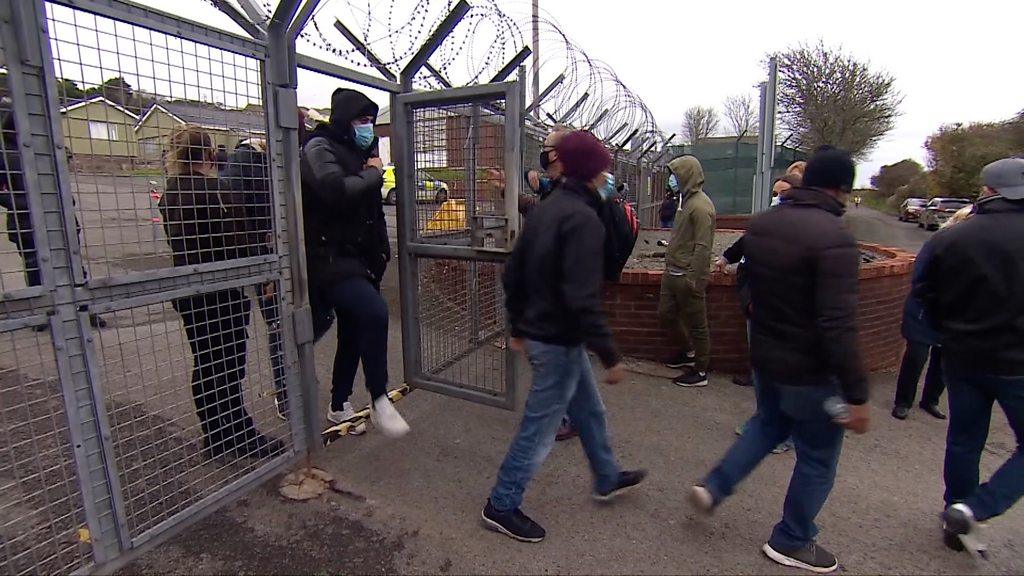
- Published11 November 2020
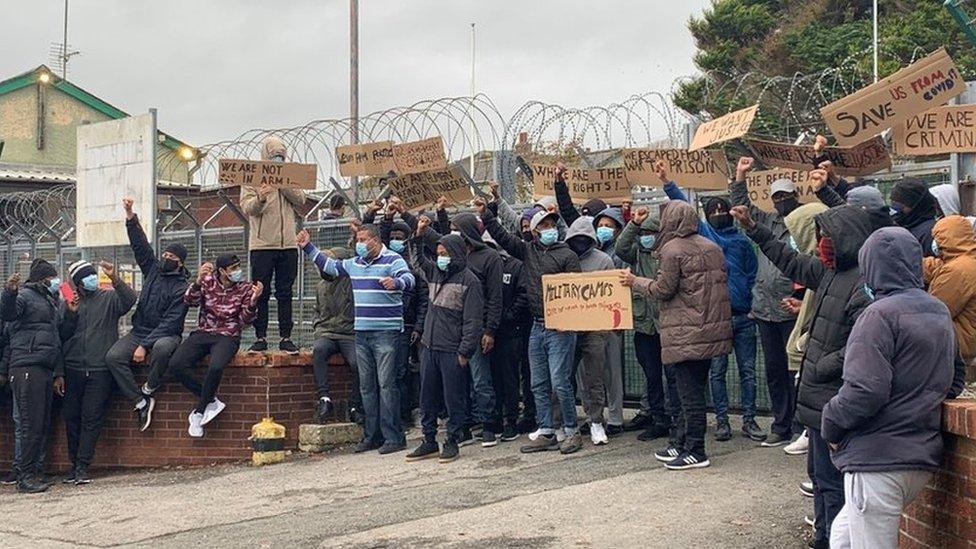
- Published1 October 2020
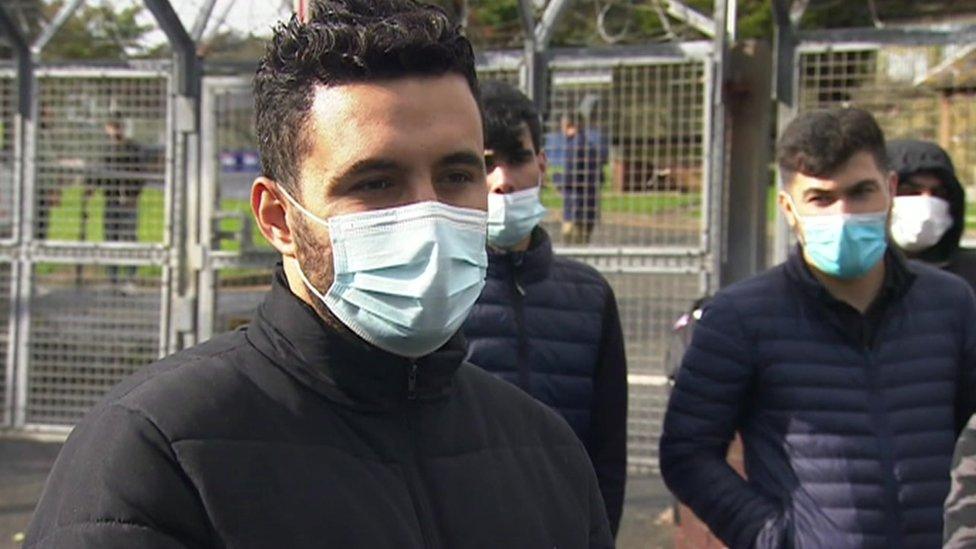
- Published11 October 2020
